The National Police of Ukraine are not authorized to consider cases of military registration violations
From: National Police of UkraineReceived: 08.10.2025
The request was submitted to obtain an official clarification regarding the powers of the National Police of Ukraine when interacting with the civilian population.
Specifically, the request seeks to determine whether police officers are authorized to obstruct the free movement of peaceful civilians within the territory of Ukraine, issue administrative fines without legal grounds, or use physical force and other coercive measures (such as detention or escorting) without proper legal justification.
The purpose of the inquiry is to clarify the legal basis and scope of police authority as defined by current Ukrainian legislation, and to ensure the protection of citizens’ constitutional rights and freedoms in accordance with the Constitution of Ukraine and the Law of Ukraine “On the National Police.”
Attachments: 0 ... Read more ⇢Unlawful “Recruitment Searches” in Ukraine: How TRCs and Police Detain Civilians Without Legal Grounds
From: National Police of UkraineReceived: 08.10.2025
In Ukraine, there is a structure known as TRC & SP — Territorial Recruitment and Social Support Centers. Formally, they are responsible for mobilization, registration, and providing assistance to servicemen. In practice, however, they have become the most discredited government body, engaged in forced conscription.
To justify their actions, the Ministry of Defense of Ukraine implemented a digital system called “Reserve+,” through which the TRC & SP maintain an internal database of so-called “wanted” individuals — civilians they consider to be evading mobilization.
These data are shared with centralized databases accessible to the police. When police officers stop someone on the street and see that the person is “wanted” according to the TRC & SP, they are obligated to detain and deliver the individual to the military enlistment office.
However, an official response from the National Police of Ukraine (above) - confirms that there is no legal basis for declaring individuals wanted for administrative offenses, including draft evasion. Legally, TRC & SP have no au
Attachments: 0 ... Read more ⇢Why Israel Is a Party to the Conflict, and Ukraine Is an Aggressor Alongside Russia
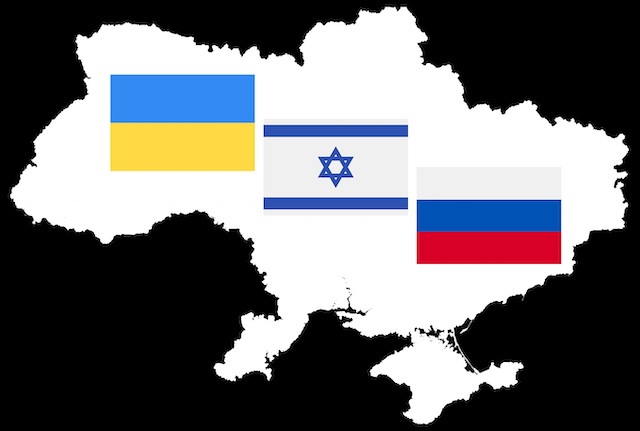
The Ukrainian people formalized an act of self-determination in 1990–1991, when the Declaration of State Sovereignty explicitly established that Ukraine is a sovereign national state and that the bearer of sovereignty in the Republic is the people of Ukraine.
At the same time, the Declaration had a dual structure: in the section “Self-determination of the Ukrainian Nation” the national-ethnic component was enshrined — the act of self-determination of Ukrainians and the establishment of Ukraine as a national state, while in the section “Popular Sovereignty” the civic component was set out, where the people of Ukraine were defined as the totality of all citizens of Ukraine of all nationalities.
The 1996 Constitution enshrined in Article 5 the provision that the people are the sole source of power and sovereignty, but without s ... Read more ⇢
Why Ukrainians Are Not Granted Refugee Status
Although temporary protection was originally designed as an emergency response to mass displacement, its implementation in the case of Ukrainians has resulted in a separate legal track — one that avoids the full recognition, obligations, and legal procedures associated with refugee status.
This could have been resolved through a single directive, using the same mechanism that introduced temporary protection, but aimed at simplifying access to refugee status.
In reality, however, Ukrainians are granted this status only in rare, exceptional cases.
Instead, the system is set up in such a way that applying for refugee status becomes so difficult, slow, and overwhelming that most people give up and accept temporary protection by default — often without even realizing they had another option.
The key difference between temporary protection and refugee status lies in the amount of information required for mandatory collection. To obtain full refugee status, one must not only verify their identity — in most cases, a passport is sufficient — but also provide ethnic ... Read more ⇢
Karaites and Krymchaks cannot be considered indigenous peoples of Ukraine
The recognition of the Karaites and Krymchaks as indigenous peoples of Ukraine contradicts Article 1 of the Law of Ukraine No. 1616-IX “On the Indigenous Peoples of Ukraine,” which stipulates that an indigenous people cannot have its own state-forming entity outside of Ukraine. This decision also fails to comply with international law. In particular, Article 33 of the United Nations Declaration on the Rights of Indigenous Peoples affirms the right of indigenous peoples to determine their identity and membership in accordance with their own customs and traditions, as well as to establish their institutions and determine their members.
This provision excludes the possibility of multiple ethnic identities and presupposes the integrity of legal subjectivity. Therefore, an ethnic group cannot simultaneously be recognized as a distinct indigenous people of Ukraine and as part of the Jewish people, which possesses its own nation-state.
The Karaites and Krymchaks do not meet the specified criteria, since under Israeli law they are recognized as part of the Jewish people and enjoy the right of repatriation to the State of Israel. This right directly demonstrates the exis ... Read more ⇢
"Safe Regions" of Ukraine as a New Form of Fascist Practice
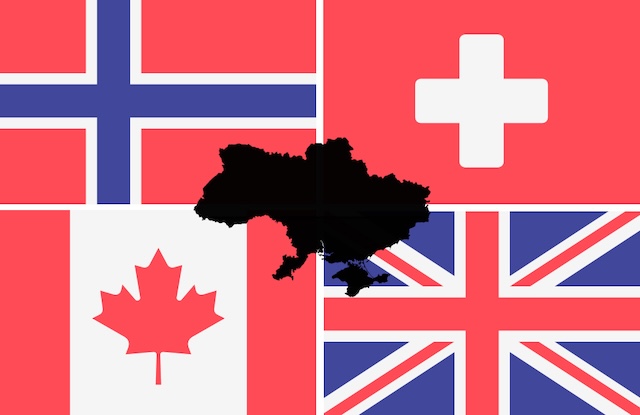
The policy of denying asylum to Ukrainian refugees under the pretext of “safe regions” in Ukraine ominously echoes the Nazi practice of the 1930s–1940s, when the fiction of “organized ghettos” and “reservations” justified the segregation, deportation, and extermination of Jewish populations. Ghettos like those in Warsaw or Łódź were presented as “safe” zones under Nazi control but served as instruments of isolation, repression, and preparation for the “Final Solution.” Neutral countries such as Switzerland were complicit, refusing Jewish refugees entry under formal pretexts, thereby legitimizing Nazi crimes.
Today, Norway, the United Kingdom, Switzerland, and Canada, by invoking the concept of “safe regions,” ignore the legal vacuum created by derogation and internal apartheid in Ukraine. This policy turns refugees from war victims into “voluntarily returned persons,” absolving states of responsibility for their fate.
... Read more ⇢
Apartheid of Ukrainians and the Hidden Interethnic Conflict
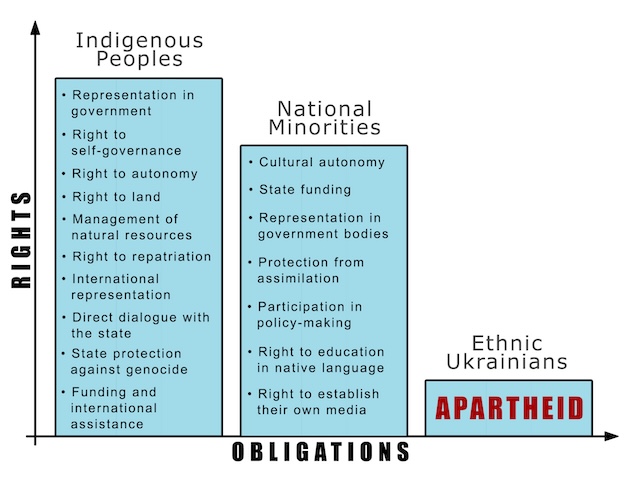
Under the cover of external aggression, a legal regime was established in Ukraine that exhibits features of institutionalized apartheid and interethnic conflict. The largest ethnic group — Ukrainians — has been stripped of status, collective rights, mechanisms of international protection, and even the possibility of legal self-preservation. These changes were deliberately enshrined in national legislation under martial law, indicating a conscious shift in focus from external threat to internal reconfiguration of the sovereign subject.
While formally appealing to the idea of national unity, the state manipulates the concept of “the people” by exploiting constitutional ambiguity between the collective sovereign and the totality of citizens. Depending on political expediency, the authorities arbitrarily alternate between these constructs, excluding Ukrainians from all forms of ethnically defined legal subjectivity. This subst ... Read more ⇢
Interethnic Conflict of Interests
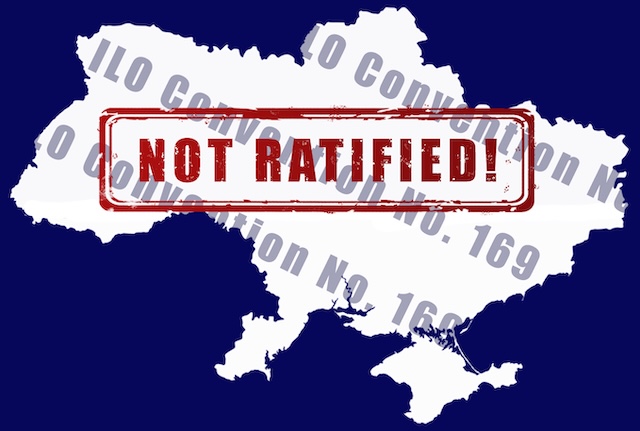
One of the clearest pieces of evidence demonstrating the formal and superficial nature of Ukraine’s Law No. 1616-IX “On Indigenous Peoples of Ukraine” is the fact that, during its adoption, the state employed terminology and rhetoric borrowed from the International Labour Organization’s Convention No. 169 — without actually ratifying the Convention. This creates a fundamental contradiction: Ukraine adopted the external framework of international law but refused to accept its binding obligations.
What is ILO Convention No. 169 and why is it essential?
It is the only universal international convention that protects the collective rights of indigenous peoples. Adopted in 1989, it is considered the principal legal instrument for safeguarding:
– the right to self-determination;
... Read more ⇢
Chronology of the Nullification and Displacement of Ethnic Ukrainians from Ukraine’s Legal Framework
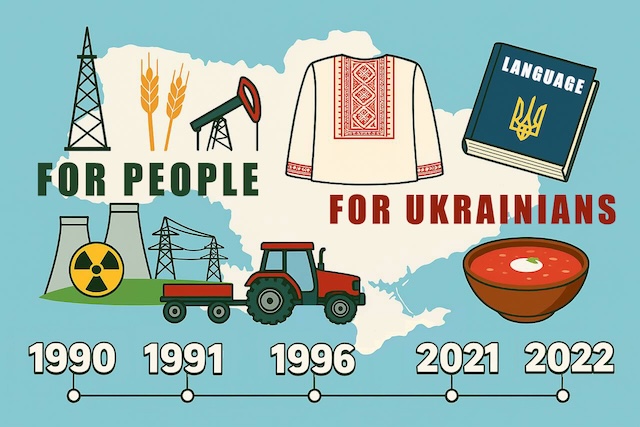
The fundamental misconception of the international community, including Ukrainians themselves, lies in the belief that cultural attributes were perceived as proof of the existence of a people. However, the right to speak the Ukrainian language is not equivalent to the status of a people in the legal sense.
For 21 years, from 1996 to 2021, Ukraine built a civic society in which the concept of “people” was interpreted universally — as the totality of citizens without ethnic distinctions.
But in 2021 the model of state organization was once again restructured — this time along ethnic lines. Certain groups received a legally enshrined status of “people” with all collective rights — to land, resources, self-government, and sovereignty. At the same time, ethnic Ukrainians were left only with language, borshch, and the vyshyvanka — cultural symb ... Read more ⇢
No People, no Duty - Why mobilizing Ukrainians may be a Crime
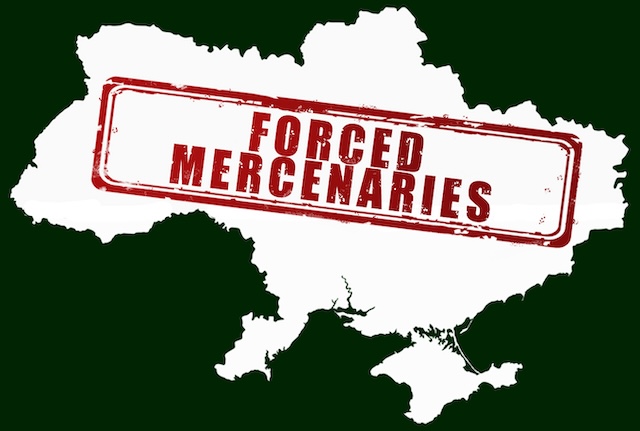
1. Linguistic and Legal Clarification
The Meaning of “Narod” in Slavic Traditions vs. “People” in Western Legal Culture
In Anglo-Saxon legal and constitutional traditions, the word “people” is semantically broad and historically flexible. It can refer both to the entire population of a country (“the people of France”, “the American people”) and to a sovereign political subject, endowed with authority and collective rights (“We the People” of the United States Constitution).
This semantic fusion emerged from the Enlightenment political philosophy of the 17th–18th centuries, in which sovereignty was transferred from monarchs to “the people” as an abstract political entity. The term became a legal placeholde ... Read more ⇢
What is Derogation — Protection from Expulsion, Deportation, and a basis for Asylum
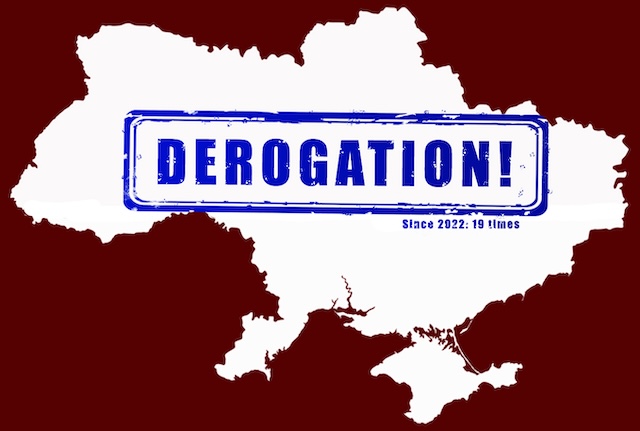
1. Derogation in International Law
Derogation is an official legal term that refers to the temporary suspension by a state of its obligations to protect human rights. It is applied in situations of war, a state of emergency, mass unrest, or another exceptional threat to the life of the nation. When a state declares a derogation, it notifies international organizations — such as the Council of Europe or the United Nations — that it is unable to fully comply with the rights enshrined, for example, in the European Convention on Human Rights (ECHR) or the International Covenant on Civil and Political Rights (ICCPR).
Such a suspension is regulated by:
• Article 15 of the European Convention on Human Rights (ECHR)
• Article 4 of the International Covenant on Civil and Political Rights (ICCPR)
A state that intro ... Read more ⇢
Exclusion of ethnic Ukrainians from the source of Ukraine’s sovereignty
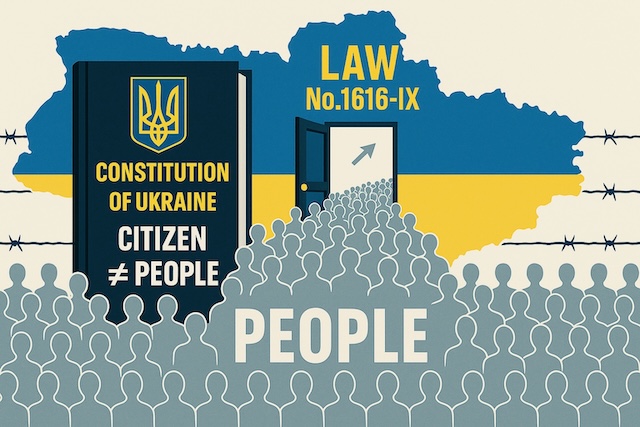
According to the Law of Ukraine No. 1616-IX “On Indigenous Peoples of Ukraine” dated July 1, 2021, ethnic Ukrainians are not included in the list of indigenous peoples. This law, introduced by President Volodymyr Zelensky as urgent, granted indigenous status to three ethnocultural groups — Crimean Tatars, Krymchaks, and Karaites — without any limitations regarding their population size, place of residence, or citizenship, extending their rights across the entire territory of Ukraine.
At the same time, the titular nation — ethnic Ukrainians — as well as autochthonous Ukrainian subethnic groups such as Boykos, Hutsuls, Lemkos, Volynians, Podolians, Slobozhans, and Polishchuks, were entirely excluded from the list of indigenous peoples and from the system of collective rights. None of these groups received legal recognition as a people, despite their deep historical rootedness, unique ... Read more ⇢
Evidence of the systematic Genocide of the Ukrainian people
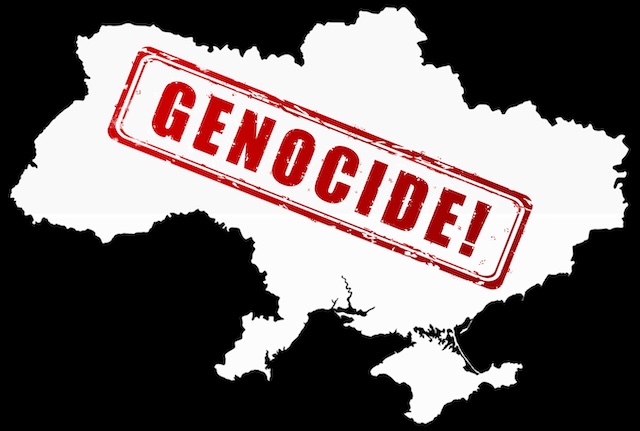 v1.2
v1.2
I. International Complicity in the Organization of Internal Terror in Ukraine
The European Union, the United States of America, the United Kingdom, Canada, Australia, Switzerland, Japan, and other donor states bear direct international legal responsibility for complicity in organizing large-scale internal terror on the territory of Ukraine. By continuing to provide multibillion-dollar unconditional funding to the Ukrainian regime in the context of official derogation from its human rights obligations, these states effectively ensure the uninterrupted operation of a repressive apparatus committing systematic international crimes.
Part of the donor countries’ funds is directed toward financing:
-
Forced mobilization of citizens, including elements of violence,
The war through the eyes of a Ukrainian - Legal arguments against State repressions
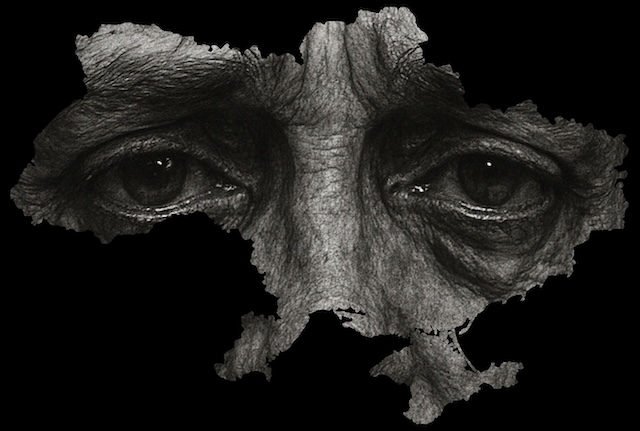
v4.7 - to be updated...
This document provides a comprehensive legal and factual analysis of systemic human rights violations and institutional repression in Ukraine between 2022 and 2025. Based on constitutional law, international treaties, and documented cases, it demonstrates how the Ukrainian government has employed selective conscription, suppression of dissent, and extrajudicial measures under undeclared state of war conditions. The report highlights the use of internal structures - including the Territorial Centers of Recruitment (TRC), the Security Service of Ukraine (SBU), and other state organs - to enforce coercive policies that undermine civil liberties, democratic governance, and legal protections.
The document is not written by a legal professional, but by a Ukrainian citizen directly affected by these policies. Its purpose is twofold:
(1) to raise awareness ... Read more ⇢
Legal justification of discrimination against Ukrainians through the Temporary Protection mechanism
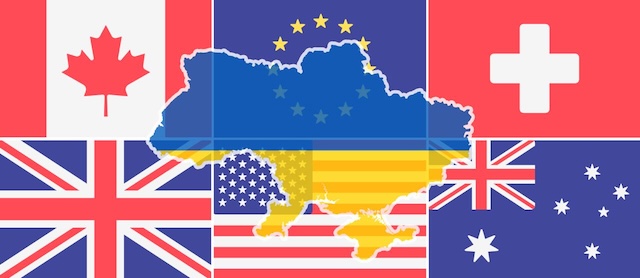
v.9.2 - to be updated...
1. Introduction
Ukrainians displaced by the war have not been granted refugee status under the 1951 Refugee Convention. Instead, they are placed under temporary protection frameworks, which lack long-term guarantees and legal security.
Although widely referred to as “refugees” in public discourse, their status does not legally qualify as such. They remain in alegal gray zone, where they are denied the full protections afforded by international refugee law.
1.1. Governments apply selective legal reasoning to justify this approach:
• When addressing legal obligations, they avoid classifying Ukrainians as refugees under the 1951 Refugee Convention, instead framing temporary protection as an emergency measure due to the unprecedented number of arrivals.
... Read more ⇢
Germany: The Unlawfulness of the Extradition of a Ukrainian Citizen Due to National and Gender-Based Discrimination
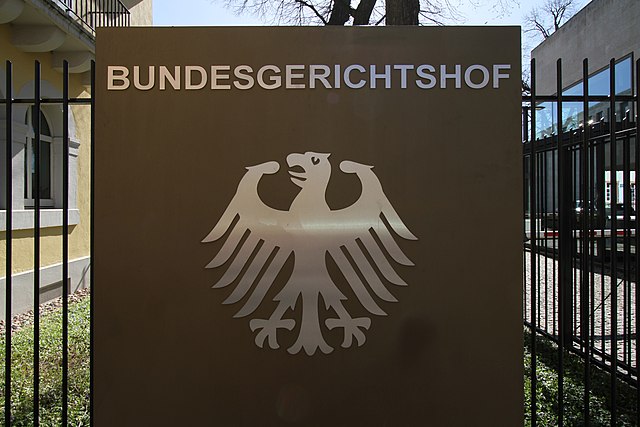
Photo by Gerd Eichmann, CC BY 4.0, via Wikimedia Commons.
The decision of the Federal Court of Germany (BGH) on January 16, 2025, permitting the extradition of a Ukrainian citizen despite his conscientious objection to military service, constitutes a clear case of national and gender-based discrimination. This decision violates international legal norms, particularly Article 14 of the European Convention on Human Rights (ECHR) and Article 26 of the International Covenant on Civil and Political Rights (ICCPR), both of which prohibit discrimination based on nationality and gender. Furthermore, the risk of forced conscription upon extradition raises serious concerns under Article 3 of the ECHR, which prohibits torture and inhuman or degrading treatment.
1. National Discrimination in the Application of Extradition Law
... Read more ⇢
Germany: Ukrainian refugees demand Alexander Dobrindt face trial for his discriminatory remarks and incitement of hatred
 Photo by CSU-Landesleitung, CC BY-SA 3.0 DE, via Wikimedia Commons
Photo by CSU-Landesleitung, CC BY-SA 3.0 DE, via Wikimedia Commons
Regarding the statements made by Alexander Dobrindt, head of the Christian Social Union (CSU) parliamentary group in the Bundestag, during an interview with Bild am Sonntag on June 23, 2024, it has been established that these statements contain elements of discrimination against Ukrainian refugees, violating their rights to protection and support in accordance with international law, national law, and the criminal law of Germany.
Factual Background
In his statement, Alexander Dobrindt proposed sending Ukrainian refugees back to their home country if they fail to find employment in Germany, despite the ongoing military conflict in Ukraine. He also criticized the payment of welfare benefits to refugees, claiming that guaranteed benefits slow down their job-seeking efforts.
This statement triggered sharp criticism from representatives of the Social ... Read more ⇢
The Silent Hunt on Ukrainians - A Crisis of Discrimination in the EU
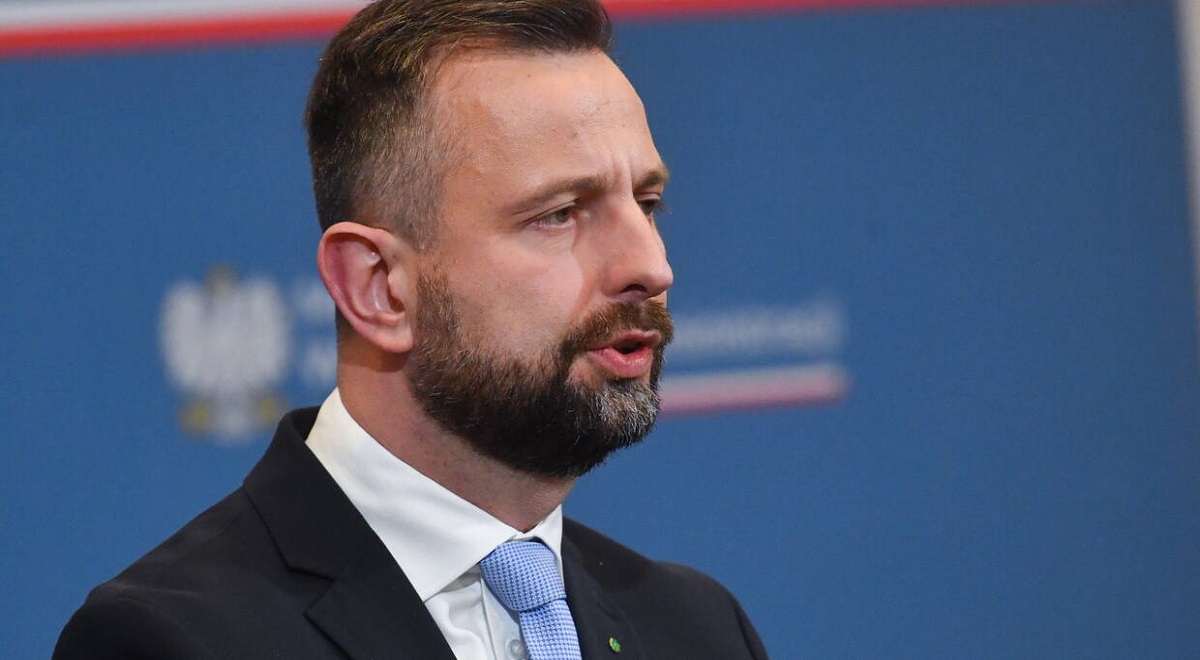
Władysław Kosiniak-Kamysz.
Photo: PAP/Piotr Nowak - the Deputy Prime Minister of Poland and the Minister of National Defence
It is crucial to acknowledge the differential treatment between various national groups. Notably, while Poland and Lithuania have pledged to assist in the repatriation of Ukrainian men subject to military draft, thereby recognizing their vulnerable status, the broader policies enacted by the EU fail to protect these same individuals under the established norms of international refugee law. This selective enforcement contravenes Article 14 of the Universal Declaration of Human Rights, which guarantees the right to seek and enjoy asylum from persecution, as well as the non-refoulement principle enshrined in the 1951 Refugee Convention.
Moreover, the contrasting responses of the European Union to the restrictive ... Read more ⇢
Sweden: Elaf Ali’s Remarks on Ukrainian Refugees Incite Outrage and Accusations of Discrimination
On Swedish State Television, during the program “IFS - Invandrare för Svenskar” on the national channel SVT, journalist Elaf Ali made a controversial joke about Ukrainian women who have sought refuge in Sweden.
Ali quipped,
“They’re blond and blue-eyed, so their presence is hardly noticeable, except maybe in the brothels.”
Source: Visegrád 24
This remark was made in the context of a segment intended for humor.
Elaf Ali’s derogatory comments about Ukrainian refugees, specifically women, on Swedish State Television raise significant legal concerns, potenti ... Read more ⇢Slovakia: Refugees subject to conscription laws should go to Ukraine to fight - Robert Kaliňák

Photo: Jaroslav Novák/TASR
Refugees subject to Ukrainian conscription laws should go to fight in Ukraine. Slovak Defense Minister Robert Kaliňák said this in the V politike talk show. According to the head of defense, there is no need to send NATO soldiers to the territory of Ukraine.
"Of all the refugees we are protecting, (…) there is a group that corresponds to the Ukrainian conscription law," Kaliňák said in the talk show, saying that he thinks it is "the biggest help to the Ukrainian army if it has enough people."
Source:standard.sk
A potential legal violations in the statement suggesting that Ukr ... Read more ⇢
Ukrainian National Bar Association is a Private Entity
Regarding the inquiry contained within Part I, Question 178 of the European Union (EU) Questionnaire and Responses for Ukraine’s Candidacy Status:
“Does Ukraine possess a National Human Rights Institution (NHRI)? Is it in compliance with the Paris Principles concerning NHRIs, and does the NHRI hold accreditation from GANHRI, including its accreditation status?”
Ukraine’s response elucidates that the sole human rights body operational within the nation is the Human Rights Ombudsman.
There is an absence of a legal advocacy institution as delineated in the disclosed questionnaire, which raises certain implications.
The Ukrainian Bar is a non-governmental, self-governing institution tasked with ensuring the provision of defense, representation, and other forms of legal assistance on a professional basis. Furthermore, it autonomously addresses matters concerning the organization and function of the legal profession in accordance with established legal statutes.
... Read more ⇢
What is Voice of Ukrainians?
In every European state, there are not only armed forces but also intelligence agencies. In the context of the modern world, it is impossible to conceal the fact of coercive retention of a nation against its will. Consequently, governments worldwide are aware of significant human rights violations in Ukraine, yet they choose not to inform their citizens about these issues.
The international community prefers not to discuss or analyze the details and legal nuances of the conflict, wherein military actions are not legally defined as warfare, leading to the infringement of the rights of the Ukrainian people for the sake of the defensive, economic, and political interests of Western nations, and the legitimization of the privatization of state property under the condition of zero competition.
According to international law principles, failure to report a crime makes a party complicit in that crime, including crimes committed by the ruling regime in Ukraine.
Ukrainians are forced to fight for their survival not only against Russia but also against the global community, which, by ignoring human rights violation facts and its direct involvement in these violations, ... Read more ⇢
Germany: Defaming the Displaced - Ulrich Reitz’s Troubling Attack on Ukrainian Refugees
The remarks made by Ulrich Reitz have sparked debate over the potential infringement of various national and international legal principles, particularly those related to the equal treatment of refugees and anti-discrimination. Titles that might reflect the legal and ethical concerns raised by Reitz’s statement could include:
German Laws:
... Read more ⇢
Poland: General Skrzypczak talks about help in "deporting Ukrainians" from Poland
 Photo. Dawid Żuchowicz / Agencja Wyborcza.pl
Photo. Dawid Żuchowicz / Agencja Wyborcza.pl
"The Polish government should help Kiev in the deportation of Ukrainians who are in exile - said General Waldemar Skrzypczak. The Ministry of Foreign Affairs referred to this idea. "We are considering how we can support the Ukrainian side" - said the Ministry of Foreign Affairs..."
Source: gazeta.pl
General Waldemar Skrzypczak’s statements suggesting that the Polish government should assist in the deportation of Ukrainian refugees potentially violates the principle of non-refoulement, which is a fundamental aspect of international refugee law as established by the 1951 Refugee Convention and its 1967 Protocol. This principle strictly prohibits the forced return of refugees to countries where they ... Read more ⇢
Uncompensated Material and Non-Pecuniary Damages
The head of the state does not take adequate measures to restore the housing of Ukrainian citizens who were forced to move from occupied territories or areas where combat operations are conducted, as well as those who have lost their homes and other property due to the occupation.
Many Ukrainian citizens have relatives left in the occupied territories who require assistance and protection, yet the state takes no action to protect them and does not allow family reunions by prohibiting movement across the demarcation line with the occupied territories.
As a result of rights violations, Ukrainian citizens suffer both moral and material damage.
Moral harm is recognized as suffering inflicted on a citizen due to physical or psychological impact, leading to a deterioration or loss of opportunities to engage in their usual habits and desires, worsening relationships with others, and other negative moral consequences.
Compensation for moral harm is made in cases where unlawful actions by state bodies have inflicted moral loss on a citizen, led to the disruption of normal life connections, and req ... Read more ⇢
Avoidance of Responsibility by National Leadership
The leadership of the country is objectively suspected of embezzling property, that is, resources belonging to the citizens of Ukraine.
In 2023, with the assistance of parliament, the possibility was introduced to apply probationary supervision as a new form of punishment instead of imprisonment for individuals found guilty of abusing their official position, giving bribes, and bribing officials of private legal entities. In effect, such individuals would not face actual punishment.
Furthermore, one of the most frequently applied categories in the economic sphere is the composition of fraud as a criminal offense.
In Ukrainian judicial practice, for many cases of bribery, corruption, and official crimes, the criminal law provided by Article 190 of the Criminal Code of Ukraine (fraud) is applied, as it can be demonstrated in court that the corrupt individual did not act as an official.
On August 11, 2023, a law came into effect amending Article 190 of the Criminal Code of Ukraine. According to this, part 4 of the said article was renamed as part 5.
... Read more ⇢
Ukrainian Courts and the Controversy Over Border Exit Rights
Ukrainian administrative courts are systematically denying Ukrainian citizens satisfaction in lawsuits challenging the decisions of military personnel of the State Border Guard Service of Ukraine on the temporary restriction of their rights as Ukrainian citizens to leave Ukraine; the recognition as illegal and the annulment of their decisions to deny crossing the state border of Ukraine, and the obligation for them to provide Ukrainian citizens with permissions to cross the state border of Ukraine on a permanent basis according to the law, based on the passport of a citizen of Ukraine for foreign travel.
The basis for the refusal to satisfy the claim, as stated in the court decision, is that the court considers that the Rules for Crossing the State Border by Citizens of Ukraine, approved by the resolution of the Cabinet of Ministers of Ukraine No. 57 dated 17.01.1995 (hereinafter also referred to as the Rules), establish that in cases defined by legislation, for crossing the state border, citizens must also present supporting documents in addition to passport documents. According to the court’s conclusion, my right to leave the country was limited by specific provisions of the Rules for Crossing the State Border by Citizens of Ukraine. ... Read more ⇢
Breach of the Separation of Powers Doctrine
The separation of state power is the structural differentiation of three coequal primary functions of the state: legislative, executive, and judicial. It reflects the functional definiteness of each state organ, entails not only the demarcation of their powers but also their interaction, a system of mutual checks and balances aimed at ensuring their cooperation as a single state authority.
The principle of the separation of state powers only becomes meaningful under the condition that all state authorities act within a unified legal field.
This means that the legislative, executive, and judicial branches exercise their powers within the limits established by the Constitution of Ukraine and in accordance with the laws of Ukraine (Part Two of Article 6 of the Constitution).
State authorities and local self-government bodies, and their officials are obliged to act only on the basis, within the limits of the powers, and in the manner provided by the Constitution and laws of Ukraine (Part Two of Article 19 of the Constitution of Ukraine).
... Read more ⇢
Justice Undermined by Ukraine's Supreme Court Abolition
In Ukraine, the actions of unlawful judicial authorities fail to protect the rights and legitimate interests of citizens.
During the judicial reform of 2016, the Supreme Court of Ukraine was abolished. A new Supreme Court was established in its place through a separate competition. The authors of the reform intended this process to purge the highest judicial body of corrupt judges. The parliament amended the Constitution and changed the name of the institution from “Supreme Court of Ukraine” (SCU) to simply “Supreme Court” (SC).
In February 2020, the Constitutional Court issued a decision declaring the abolition of the SCU unconstitutional and called on the parliament to immediately rectify the situation. This decision recognized the abolition of the Supreme Court of Ukraine and the provisions on lower amounts of lifetime financial support for retired judges who did not pass the qualification assessment as unconstitutional.
The European Court of Human Rights (ECHR) in case No. 11423/19 “Gumenyuk and others vs. Ukraine” concluded that the abolition of the Supreme Court of Ukraine during the 2016 judicial reform was unlawful, as stated in ... Read more ⇢
Discrimination Against Ukrainian Citizens Abroad
Ukrainian authorities and officials within the European Union are accusing thousands of Ukrainian men of crimes stipulated by Article 366 of the Criminal Code of Ukraine (evasion from mobilization) without having sufficient grounds for such accusations, as they lack information that these individuals are sought for committed crimes. Consequently, they predispose local citizens of the EU against Ukrainian men, which may lead to illegal actions against Ukrainians who are refugees in other countries.
They assert that Ukrainians should return and fight for their families, thereby unequivocally proposing to discriminate against men. This constitutes discrimination on the basis of gender.
Article 14 of the Convention for the Protection of Human Rights and Fundamental Freedoms (Rome, 4.XI.1950) prohibits discrimination. The enjoyment of the rights and freedoms recognized in this Convention must be secured without any discrimination on any ground such as sex, race, color of skin, language, religion, political or other beliefs, national or social origin, association with a national minority, property status, birth, or any other status.
... Read more ⇢
The Aggressive Curtailment of Conscription Exemptions in Ukraine
Thus, the Law of Ukraine “On Mobilization Preparation and Mobilization” was amended in 2005 with Article 23, during Ukraine’s first revolution (Orange Revolution), to include, among others, the right for members of the Ukrainian parliament and deputies of the Supreme Council of the Autonomous Republic of Crimea to defer conscription during mobilization.
In 2014, following the second revolution (Euromaidan), the aforementioned article was supplemented with a new section according to Law No. 1575-VII of July 3, 2014, establishing that full-time students are also exempt from conscription for military service during mobilization and special periods.
In 2022, following a large-scale invasion, the article was further amended to exempt individuals with a spouse with disabilities and/or one of their parents or the spouse’s parents with a disability of group I or II from conscription during mobilization (paragraph eleven of part one of Article 23 in the version of Law No. 2122-IX of March 15, 2022).
However, in 2023, the rights granted were narrowed, and individuals with a spouse with a disability and/or one of their parents or the spouse’s parents w ... Read more ⇢
The Egregious Curtailment of Free Movement in Ukraine
By Resolution No. 724 of the Cabinet of Ministers of Ukraine dated August 25, 2010, amendments were introduced to paragraph 4 of point 2 of the Rules for the Crossing of the State Border by Citizens of Ukraine, previously approved by its Resolution No. 57 dated January 27, 1995.
According to the aforementioned amendments, it was established that “In cases determined by legislation, for crossing the state border, citizens must also have supporting documents in addition to passport documents.”
Thus, the government had preemptively taken certain actions by adopting Resolution No. 724 dated August 25, 2010, which limited the existing scope of rights of Ukrainian citizens to cross the state border of Ukraine, and this was later utilized in 2022.
In 2022, continuing its unlawful actions aimed at narrowing the rights of Ukrainian citizens, the government introduced additional amendments to the Rules for the Crossing of the State Border by Citizens of Ukraine, approved by Cabinet of Ministers Resolution No. 57 dated January 27, 1995, specifically by adopting point 2-6 of these Rules, ... Read more ⇢
The Sole Authority to Restrict Rights in Ukraine
The Constitutional Court of Ukraine, in its decision No. 10-r/2020 dated August 28, 2020, stated that “the restriction of constitutional rights and freedoms of a person and citizen is possible only in cases defined by the Constitution of Ukraine. Such restriction can only be established by law – an act adopted by the Verkhovna Rada as the sole legislative authority in Ukraine. Establishing such a restriction by a subordinate legal act contradicts Articles 1, 3, 6, 8, 19, 64 of the Constitution of Ukraine” (paragraph 3.2 of the reasoning part of the Decision of the Constitutional Court of Ukraine dated August 28, 2020, No. 10-r/2020).
The Constitutional Court of Ukraine clarified that, according to paragraphs 41 and 45 of the Report “Rule of Law,” approved by the European Commission “For Democracy through Law” (25-26 March 2011), the elements of the rule of law include: legality, including a transparent, accountable, and democratic process of enacting legal provisions; legal certainty; prohibition of arbitrariness; access to justice, represented by independent and impartial courts, including those exercising judicial oversight over administrative activity; respect for human rights; prohibition of ... Read more ⇢
Navigating Border Regulations - Document Requirements for Ukrainians
Article 3 of Ukraine’s “Law on the Procedure for Departure from and Entry into Ukraine by Ukrainian Citizens” sets forth a straightforward principle: Ukrainian citizens should cross the state border at designated points, armed with the requisite documents enumerated in Article 2. This provision ensures a structured and lawful framework for international travel.
However, Regulation No. 57 introduces a murky area during martial law periods, failing to explicitly mandate additional documentation for men, thereby creating a loophole that undermines the clarity and intent of the law. Moreover, the regulation ambiguously skirts around the issue of whether Ukrainian males aged 18 to 60 are outright forbidden from exiting Ukraine during martial law, leaving room for arbitrary enforcement and potential misuse of power.
Paragraph 2 of the Rules attempts to clarify the procedure for crossing the state border, emphasizing the necessity of presenting legally sanctioned documents, such as a passport for international travel. The law underscores that any supplementary document requirements must be transparently stipulated within the legislative texts. Yet, the ambig ... Read more ⇢
Decoding Ukraine’s Law on Citizens’ Exit Rights
The Preamble of the Law of Ukraine No. 3857-XII dated January 21, 1994, “On the Procedure for Departure from Ukraine and Entry into Ukraine of Ukrainian Citizens,” states:
“This Law regulates the procedure for exercising the right of Ukrainian citizens to depart from Ukraine and enter Ukraine, the procedure for processing documents for foreign travel, determines the cases of temporary restriction of citizens’ right to depart from Ukraine, and establishes the procedure for resolving disputes in this sphere.”
Article 1 of the Law establishes that a citizen of Ukraine has the right to depart from Ukraine, except in cases provided for by this Law, and to enter Ukraine.
Thus, the above provision establishes that only this Law, and not any other normative legal act (presidential decree, government resolutions, other laws, directives, and letters from the h ... Read more ⇢
The Illegal Restriction of Movement by State Officials
State officials in Ukraine are engaged in a blatant disregard for constitutional rights, notably violating Article 33 of the Ukrainian Constitution, which unequivocally guarantees every individual within Ukraine’s territory the freedom of movement, the free choice of residence, and the unrestricted right to leave the country, subject only to legal restrictions. In a grave overstep, these officials are enforcing subordinate regulations—namely, the Rules for crossing the state border established by the Cabinet of Ministers of Ukraine under Law No. 3857-XII—which, not being laws themselves, starkly contradict the Constitution, the Law of Ukraine, and the stipulations of international treaties.
This overreach is further compounded by the military command’s misuse of their authority to limit citizens’ movements, an authority that should be strictly defined by the Cabinet of Ministers of Ukraine as outlined in point 6 of part 1 of Article 8 of the Law “On the Legal Regime of Martial Law”. The “Procedure for establishing a special regime of entry and exit, restriction of the freedom of movement of citizens, foreigners, and stateless persons, as well as the movement of vehicles in Ukraine or in its ... Read more ⇢
Military Command’s Egregious Violations Under Martial Law
In a blatant defiance of the legal framework set by Law 389-VIII, “On the Legal Regime of Martial Law,” dated May 12, 2015, the military command has engaged in egregious overreaches that starkly violate the constitutional rights of Ukrainian citizens. This law, which specifies the conditions under which martial law may be invoked, clearly limits the scope of temporary restrictions on rights and freedoms to those expressly outlined by presidential decree and ratified by the Verkhovna Rada of Ukraine.
Contrary to these legal stipulations, the military command has usurped powers not granted to them, notably by imposing unwarranted restrictions on citizens’ freedom to move and cross borders. Such actions blatantly contravene the directives of Article 3, Section 2, and point 6 of part 1 of Article 8 of Law 389, which confine military authority to specific measures such as establishing special entry and exit regimes within Ukraine, as detailed by the Cabinet of Ministers of Ukraine No. 1455 resolution dated December 29, 2021.
This unauthorized assertion of power by the military at border crossings is a clear infringement of the Law of Ukraine “On the Procedure for Exit from Ukraine and Entry into Ukraine of ... Read more ⇢
The Misguided Judicial Support for Unlawful Restrictions
Article 106 of the Ukrainian Constitution clearly delineates the powers vested in the President of Ukraine, notably omitting any authority to curtail citizens’ rights, even amidst the enactment of martial law. Despite this constitutional limitation, Ukrainian courts have erroneously upheld Presidential Decree No. 64/2022, dated 24 February 2022, “On the Imposition of Martial Law in Ukraine,” as a basis for restricting the fundamental right of citizens to freely exit the country during martial law periods.
Such interpretations grossly exceed the constitutional framework, as it is unequivocally impermissible under Ukrainian law to introduce amendments or new regulations that impose restrictions on the freedom of citizens to leave the country that are more stringent than those existing at the time of the Constitution’s enactment in 1996.
The constitutional and legal landscape of Ukraine does not permit the amendment of the Law of Ukraine “On the Procedure for Exit from Ukraine and Entry into Ukraine for Ukrainian Citizens” or the enactment of other regulatory legal acts to unjustly narrow the pre-established right of Ukrainian c ... Read more ⇢
Unlawful Discrimination in Times of Martial Law
Despite the clear directives of Part 2 of Article 64 and Article 24 of the Constitution of Ukraine, which mandate the equality of all citizens and prohibit any restrictions on constitutional rights and freedoms based on gender, social, or economic status, even during martial law, Ukrainian authorities have instituted discriminatory practices that starkly contravene these constitutional provisions.
Article 24 emphatically asserts the principle of equality before the law, explicitly forbidding any form of discrimination, including on the grounds of gender or social origin. Yet, in a blatant disregard for these constitutional safeguards, Ukrainian policies during martial law have unjustly targeted men aged 18 to 60, along with those outside the echelons of state leadership, imposing on them undue restrictions on their right to exit the country.
This selective enforcement of travel restrictions not only violates the Constitution of Ukraine but also undermines the very principles of equality and justice that form the bedrock of a democratic society. The imposition of such discriminatory measures based on gender and social status is a direct affront to the rule of l ... Read more ⇢
Grave Violation of Constitutional Rights by Ukrainian Athorities
State officials and the judiciary in Ukraine are engaging in a flagrant violation of the Constitution by failing to uphold the unequivocal mandates of Article 22, which solemnly guarantees the inviolability of constitutional rights and freedoms. This article explicitly states that no new law or amendment can curtail the breadth and depth of the existing rights and liberties afforded to Ukrainian citizens.
The government’s enactment of subordinate legislative acts that diminish these rights further exacerbates this breach of constitutional duty, directly contravening the legal principle that no legislative change should ever infringe upon the established freedoms of the populace.
Current Ukrainian legislation categorically prohibits any modification to laws that would unjustly impose additional constraints on the citizens’ inherent freedom to exit the country or evade conscription during periods of mobilization, as previously delineated by law.
The situation is further aggravated by pervasive discriminatory practices sanctioned by the state, in clear violation of Part 2 of Article 64 and Article 24 of the Constitution of Ukraine. These articles enshrine t ... Read more ⇢
Abuse of Military Power - Violating Citizens’ Rights in Ukraine
In a flagrant violation of constitutional law, military entities such as the Armed Forces of Ukraine, State Border Guard Service of Ukraine, National Guard of Ukraine, and others, along with state and judicial bodies and their officials, are systematically infringing upon the rights and freedoms of Ukrainian citizens, directly contravening Article 17 of the Constitution of Ukraine. This article explicitly prohibits the use of military formations to restrict citizens’ liberties.
Despite the clear mandate in Article 1 of the Law of Ukraine on the Armed Forces of Ukraine, which obligates military administrative bodies to uphold the constitutional ban against employing the Armed Forces to curtail civil rights, there exists a pervasive pattern of rights violations orchestrated by the military. These include unauthorized detentions at borders, prevention of citizens’ departures, arbitrary street detentions, and illicit confinements within so-called mobilization and social support centers - Territorial Center for Recruitment and Social Support.
Such actions not only defy the Constitution but also transgress criminal law, as delineated in Part 3 of Article 371 and Part 3 of Article 146 of the Criminal Code of Ukraine. These articles pre ... Read more ⇢
The Deliberate Disregard for International Treaty Rules
Ukrainian courts are engaging in a deliberate and egregious violation of international law by systematically ignoring the rights enshrined in significant international treaties to which Ukraine is unequivocally bound. The blatant disregard for Protocol No. 4 to the Convention for the Protection of Human Rights and Fundamental Freedoms, ratified under Ukrainian Law No. 475/97-VR on 17 July 1997, which unequivocally grants individuals the right to leave any country, is a stark testament to the judiciary’s neglect of its legal obligations.
This flagrant oversight is compounded by the courts’ failure to uphold Article 12 of the International Covenant on Civil and Political Rights, ratified by Decree No. 2148-VIII on 19 October 1973, which similarly safeguards the freedom of movement. The judiciary’s neglect of this critical provision further exposes a deep-seated contempt for Ukraine’s international commitments.
The disregard extends to Article 13 of the Universal Declaration of Human Rights, a cornerstone of global human rights adopted on 10 December 1948, which guarantees freedom of movement and residence. The Ukrainian judiciary’s ... Read more ⇢
Martial Law vs. State of War - Legal Distinctions and International Recognition
From a legal standpoint, the concept of “martial law” is more thoroughly delineated within Ukraine’s “Law on the Legal Regime of Martial Law” compared to the vague treatment of a “state of war” in the “Defense of Ukraine Law.” The crucial distinction rests on international acknowledgment of Ukraine being in a state of war, a status vital for rectifying breached human rights. Yet, the Ukrainian government’s failure to formally recognize a state of war with the Russian Federation has left Ukraine and Russia in a de facto state of peace. This omission blocks the path to formally concluding the war, achieving peace, and significantly, robs Ukrainian citizens of the chance to reclaim their rights and seek reparations for the war’s toll from Russia.
The imposition of martial law in Ukraine has led to curtailed citizen rights, with far-reaching implications for Ukraine’s diplomatic engagements, notably hindering Ukrainian citizens’ prospects of obtaining reparations from Russia through international legal channels.
Currently, in the eyes of international legal bodies, from the UN to various arbitration panels, the conflict is not recognized as a war. There exists a state of ... Read more ⇢
Presidential Negligence in Ukraine’s Pre-War Crisis
According to Article 106, Section 20 of the Constitution of Ukraine, the President, in accordance with the law, decides on general or partial mobilization and the imposition of martial law in Ukraine or in its specific areas in the event of a threat of aggression, danger to the state independence of Ukraine.
Pursuant to the provisions of Article 1 of the Law of Ukraine “On the Legal Regime of Martial Law” of December 12, 2015, No. 389-VIII, martial law is a special legal regime introduced in Ukraine or in its specific areas in the event of armed aggression or the threat of attack, danger to the state independence of Ukraine, its territorial integrity, and involves granting the relevant state authorities, military command, military administrations, and local self-government bodies the powers necessary to prevent the threat, repel armed aggression, and ensure national security, eliminate the threat to the state independence of Ukraine, its territorial integrity, as well as the temporary restriction of the constitutional rights and freedoms of individuals and citizens and the rights and lawful interests of legal entities with the indication of the duration of these restrictions.
... Read more ⇢
Estonia: Member of the European Jaak Madison called Ukrainian refugees cowards
On MEP Jaak Madison egregiously slandered Ukrainian refugees during a European Parliament session, labeling them as “cowards” for seeking sanctuary from mobilization and baselessly accusing them of violating Ukrainian law.
Such statements not only exhibit a profound disrespect for the individuals fleeing conflict but also represent a flagrant violation of international and European Union legal standards governing the treatment and rights of refugees:
1. Geneva Convention on Refugees:His derogatory characterization of refugees directly undermines the fundamental tenets of the 1951 Refugee Convention and its 1967 Protocol, which mandate the protection and humane treatment of individuals fleeing persecution. His remarks are an affront to the very essence of international refugee law.
2. Dublin Regulation of the European Union:
By disparaging refugees, Mr. Madison shows a blatant disregard for the EU’s structured process under the Dublin Regulation, which ensures the dignified and fair handling of asylum a ... Read more ⇢
Austria:Affidavit of Rights Infringement of Ukrainians
On August 21, 2023, at 16:29, an article was published on the website of the Austrian media outlet eXXpress (https://exxpress.at/flucht-vor-der-front-14-000-ukrainer-im-wehrfaehigen-alter-in-oesterreich/) by the editor, which criticized the flight of male ambassadors from Ukraine and incited hostility towards Ukrainians in Austria based on national origin, urging Ukrainians to return to Ukraine and fight, and even promoting discrimination based on gender, age, and nationality.
The article cited statistics and referenced Ukrainian government officials, specifically President Volodymyr Zelensky and the Ukrainian Ambassador to Austria. The editor claimed to have received the statistics from the Austrian Ministry of the Interior, which allegedly has precise data on the age of Ukrainian refugees registered in Austria, including the number of men and their age group. The article highlighted that 25% of the refugees are men aged between 18 and 54.
Furthermore, the editor personally claimed that a significant number of Ukrainian men of conscription age have managed to avoid combat at the front, with 14,000 Ukrainian men aged between 18 and 54 registered as displaced ... Read more ⇢


